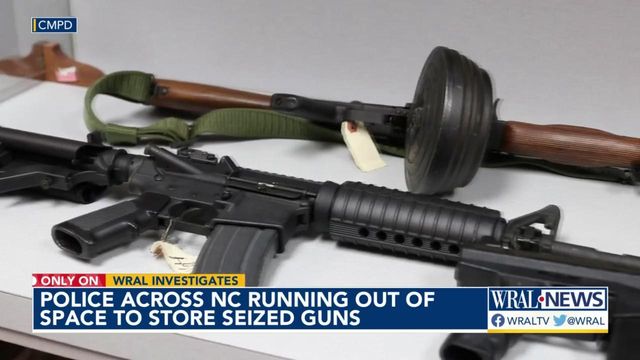NC police departments, overflowing with seized firearms, want to change law barring gun destruction
North Carolina law forbids law enforcement from destroying guns seized in criminal investigations. Some police, unwilling to sell guns back into circulation, say they're running out of storage space.
Posted — UpdatedSeveral police departments around the state say they’ve seized so many guns in recent years that they’re running out of room to store them. They want to change a state law that forbids them from destroying most firearms.
“We are really bursting at the seams, which is sad because it’s the state of the world that we are in,” Durham Police Chief Patrice Andrews said in an interview.
Andrews told the Durham City Council recently that her department leased 20,000 square feet of new warehouse space in part to store seized guns. She said the department has about 10,000 guns in storage, many of which are no longer needed for evidence but can’t be destroyed because of a 2013 state law that forbids destruction, even after the guns are no longer needed as evidence.
“I wish that we could,” Andrews said. “I honestly wish that we could just take them out and just destroy them.”
The department could sell these guns, but Andrews and other police chiefs say they don’t want them back in circulation, where they may be used in another suspected crime.
After Durham’s chief raised concerns, WRAL News reached out to 19 more of the state’s largest departments. Representatives of four of them — Charlotte-Mecklenburg, Winston-Salem, Chapel Hill and Salisbury — said they have storage concerns.
“Space is a big challenge and that we are reaching our limits,” Charlotte-Mecklenburg Police Department spokesman Mike Allinger said.
“We’ve seized a thousand guns a year for the last three years,” Winston-Salem Police Chief Catrina Thompson said. “We have storage facilities, but we’re about to run out of space.”
The issue, and the storage space allotted, varies by department. Raleigh police said that, while the department has seen an increase in seizures, it has enough space. A spokesman for the North Carolina Sheriffs’ Association said he wasn’t aware of any sheriff’s offices with a storage problem.
Law enforcement is supposed to look for a gun’s rightful owner and return it to them, unless that person is convicted of a crime using the gun. Beyond that, the options are storage, using the gun in training, donating rare guns to museums or historical societies or selling them to licensed firearm dealers. With used guns, that often means pawn shops.
“It’s not ideal, and we definitely run the risk of returning the gun to the street for use in another crime,” Salisbury Police Chief J.P. Stokes said in an email.
The North Carolina Association of Chiefs of Police has pushed for several years to change this law, according to Fred Baggett, the group’s legislative counsel.
Grassroots North Carolina, a highly active gun-rights group, has pushed back against the effort, and group President Paul Valone said any storage issues are the department’s fault because they refuse to sell valuable assets.
“Why on Earth would we want to destroy taxpayer property?” Valone said. “Does it really make a difference if a criminal uses a gun that’s already been used in a crime, or another one?”
Two years ago, State Rep. Marcia Morey, D-Durham, introduced a bill allowing destruction as part of broader gun legislation, but the idea didn’t get traction.
State Rep. John Faircloth, one of the 2013 bill’s original sponsors, said last month that he’s willing to revisit the issue, but any gun proposal opens “a long, hard discussion.”
Faircloth, R-Guilford, is a former High Point police chief. Asked why the law should protect guns used in crimes, Faircloth said, “that’s a good question.”
As for the General Assembly’s Republican leadership, Senate President Pro Tem Phil Berger said that he hadn’t heard about the issue and that any request from the police chief’s association “would be something we’d take a look at.”
Speaker of the House Tim Moore said police departments should sell the weapons “just like any other seized property.”
“The gun didn’t break the law, it was the person who had the gun who broke the law,” he said.
The House voted for a bill last year, though, to allow destruction when guns are used to badly injure or kill someone, or when a gun was used against law enforcement. House Bill 234 passed the House 113-0, but the state Senate didn’t take it up. Proposed legislation needs approval from both chambers to become law.
Eight other states—Arizona, Georgia, Kansas, Montana, North Dakota, Tennessee, West Virginia and Kentucky—have laws prohibiting the destruction of firearms seized by law enforcement, according to the National Conference of State Legislatures. North Dakota has an exception for when the gun was used in a violent crime, conference spokeswoman Kate Bryan said in an email.
Stein said now he supports changing the disposal law.
“Nearly 10 years on, our world is different,” he said in the statement. “There’s been a proliferation in guns and gun crimes, and the state law restriction on law enforcement’s ability to destroy weapons collected from criminals has had unintended consequences. The law has turned law enforcement agencies into weapons warehouses.”
• Credits
Copyright 2024 by Capitol Broadcasting Company. All rights reserved. This material may not be published, broadcast, rewritten or redistributed.






